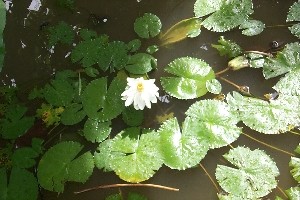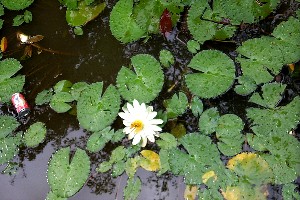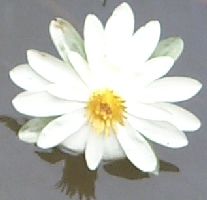 ][
][ [
[ ]
][ ][
][ [
[ ]
]
Photographed by Dana Lee Ling in Kamar, Nett, 01 November 1999. Removal of plants from pond is prohibited by tradition.
Family- Nymphaeaceae
Order- Nympheaeles
Genus- Nymphaea
Growth Form- Herb
Growth Location- Aquatic
Growth Environment- Tropical to rainforest; in a pond
Growth Zone- Temperate to tropical
Average Height- Varies, found in shallow waters
Leaf Arrangement- Whorled Arrangement
Petioles- Thin, tube-like submarine stem. Smooth and reddish, no
presence of hairs.
Leaf Blade- The floating leaves have a simple leathery blade that is nearly totally
obicular. The leaf surface above water is green with a red underside underwater. It
features a rounded apex. The base of the leaf also features an acutely-angled cavity that
comes to a point at the center of the leaf. The leaf diameter ranges from one inch and up.
Margin type is entire
Inflorescence- The flower stalks rise up from the base of the lily. This arrangement is
called an Umbel inflorescence. In a confined basin, usually only four to six flowers
bloom. But in the freedom of a pond, many more more flowers can be found. The flower
pedicel is almost always underwater and its height varies depending on how deep the base
of the lily is.
Flower- Flowers are supported by submarine stems. They are arranged zygomorphically, there is little symmetry displayed.
Corolla- Rotate corolla contains about 21 white petals. The petals are arranged freely in a polypeptalous fusion.
Description by Robert Churney, Jr.